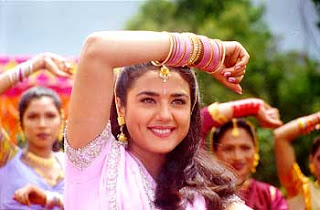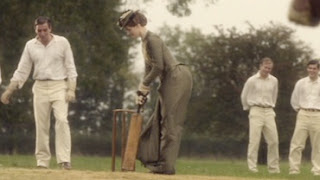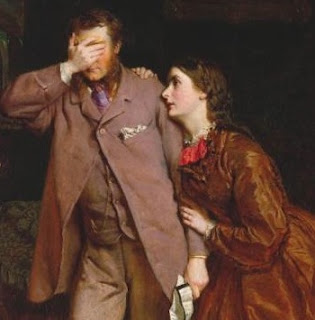Having It Both Ways: Bollywood Contradictions
"The culture industry endlessly cheats its consumers out of what it endlessly promises."
In one view, commercial movies are part of a vast culture industry intended to shape popular consciousness so that it conforms to the needs of modern capitalism. And clearly, this is true: to take an obvious example, what is product placement but an advertisement not only for a particular brand, but for consumerism as a whole? The culture industry derives profit from, in Adorno and Horkheimer's words, the "producing, controlling, disciplining" of our desires.
From another perspective, popular movies reflect the longings, aspirations and anxieties of their audiences. And clearly, this is also true: if they didn't, they wouldn't be popular. Of course, if those longings, aspirations and anxieties are created by the culture industry in the first place, the feedback loop is neatly closed. Perhaps too neatly: the culture industry is not so monolithic or univocal as it is portrayed by Adorno and Horkheimer, and popular desires, while clearly manipulable, do not always perfectly coincide with the interests of the ruling class.
Perhaps this is a reason why movies often seem to embody mixed messages. They can uphold tradition while insisting on the inevitability of change; they can extoll the virtues of simplicity while acting as advertisements for upscale consumer goods. Like most of us, perhaps, Bollywood movies often want to have it both ways.
What follows are brief discussions of two Bollywood movies (of of dozens that could be possible illustrations) that simultaneously represent markedly ambivalent points of view about moral codes, ethical dilemmas, social anxieties, and personal choices.
The obedient rebel: DDLJ
Of course, the obedient rebel of Dilwale Dulhania Le Jayenge (The Brave Heart Will Take the Bride, 1995) is its hero Raj, played by Shah Rukh Khan. Raj is a thoroughly Westernized NRI: he wears black leather jackets, drives fast cars, and drinks beer. In a famous scene early in the film he cons a six-pack out of London cornershop owner Baldev (Amrish Puri); according to Anupama Chopra's Dilwale Dulhania Le Jayenge (British Film Institute, 2002), in an early draft of director Aditya Chopra's script Raj was instead seeking condoms.
Raj seems to represent everything that the traditionalist Baldev despises and fears. To protect his daughter Simran (Kajol) from the baleful influence of boys like Raj and the society which produces them, Baldev has arranged her marriage back in his village in India with a man she has never met. But the summer before her marriage Simran is allowed to take a monthlong Eurail holiday. On that trip she meets Raj, and they fall in love. Raj follows Simran back to India and arrives at her father's village in the middle of the wedding preparations. Both Simran and, ultimately, her mother Lajjo (Farida Jalal) urge Raj to elope with her. But the Westernized rebel Raj instead wants to dutifully seek Baldev's approval: "I'll take you from here," he tells Simran, "only when your father gives me your hand in marriage."
It is Raj's insistence on fulfilling the forms of patriarchal tradition that drives many DDLJ viewers up the wall, and some reject the movie for its apparent endorsement of those patriarchal values. In a recent Masala Zindabad podcast, Beth memorably calls DDLJ a "patriarchal ball of crap."
But I think DDLJ is more complicated than that. While Raj disdains certain forms of authority—early in the movie we see him flunking out of college—he asserts the legitimacy of others, such as filial respect and love. Raj is shown to have a very close relationship with his own father, Dharam Veer (Anupam Kher), who convinces Raj to follow Simran to India. Family is important to Raj, and eloping with Simran would cut her off from her family forever. As he says to Simran, "How can you run from your own people?"
This isn't the only time Raj puts Simran's interests (or, at least, what he sees as her interests) ahead of his own. During their summer holiday he has the opportunity to have sex with a very drunk and apparently willing Simran, but he refuses to take advantage of her inebriated state. The next morning Raj makes teasing suggestions about what happened the night before, but when Simran becomes hysterical (she doesn't remember what happened, or didn't), he suddenly becomes serious: "I know what you think of me. You think I'm a wastrel. But I'm not scum, Simran. I'm a Hindustani, and I know what honour means to a Hindustani woman. Not even in my dreams can I imagine doing that to you." Again the Westernized rebel embraces Indian values.
Raj embodies ambiguity in other ways. As Anupama Chopra points out, Raj disregards the traditional divide between men's and women's roles. He is seen sitting in the kitchen with the women of Baldev's household, serving food to the wedding guests, and even observing Karva Chauth (a fast that married women undertake ostensibly to insure their husbands a long life, and more directly as a sign of their love and devotion). In one of DDLJ's many famous songs, "Mehndi Laga Ke Rakhna" ("Put on your henna"), Raj dances over a bridge separating the women and men of the wedding party, and, grabbing a veil from one of the women, dances among them as though he were one of them:
I also love how, when Raj sings "Keep your eyes downcast," Simran looks straight into his eyes.
So DDLJ and its hero Raj both subvert and uphold patriarchal codes of honor and woman-as-male-property. Despite the manifest injustice of a father insisting that his daughter marry a man she doesn't know, or love, or feel the slightest affinity with, Raj tells Simran, "Our parents have raised us with love and can decide for us better than we can." And in the end, Baldev finally gives his consent and the lovers—symbols of West and East, the modern and the traditional—are united. They, and we, have it both ways.
The anti-abortion feminist: Kya Kehna
Like DDLJ, Kya Kehna (What Is There To Say?, 2000) can be seen as both endorsing and subverting patriarchal authority. Priya (Preity Zinta) gets pregnant by the self-involved and unreliable Rahul (Saif Ali Khan). Her father and mother (Anupam Kher and Farida Jalal) go to Rahul and beg for him to marry Priya to restore the family honor.
Marriage to the womanizing narcissist Rahul might restore the family honor, but it would clearly result in misery for Priya. This is one of several occasions in the film (written by a woman, Honey Irani) where conformity to conventional morality, enforced by the father's authority, is ostensibly upheld but emotionally undercut. Marriage to Rahul is the last thing we want for Priya.
Rahul has no intention of marrying, of course, and he and his awful mother (Naveet Nishan) suggest instead that Priya have an abortion. But Priya wants to keep the baby, despite the profound personal cost. So the film can be seen in a way as anti-abortion, since abortion is advocated by characters who either forfeit or never possess our sympathies. On the other hand, it's clearly Priya's choice to keep the baby, and so the film can also be seen as powerfully advocating a woman's right to choose.
Priya and her family are ostracized, as becomes painfully obvious when her elder brother marries and no one shows up to the wedding celebrations. (What at first seems like some gratuitous slapstick at the beginning of the movie—Priya gets drenched from head to toe in mud when trying to hitchhike home from college—turns out to carry symbolic resonance when she becomes "unclean" in the eyes of the community.) Facing the loss of his family's standing, Priya's father disowns her, symbolically shattering the chair she sits in at family meals and barring her from the house. He's clearly in the wrong, although our responses of shock and dismay are complicated by the fact that the father is played by the immensely sympathetic Anupam Kher. Once again we are encouraged to take a highly critical stance towards his enforcing of conventional morality. While no one directly challenges his authority, ultimately he is convinced by the rest of the family to go after Priya and ask for her forgiveness. Patriarchal authority is restored, but only with the active consent and support of those who are supposedly governed by it. The family (along with Priya's loyal friend Ajay (Chandrachur Singh)) then vows to defy the community together (song ends at 1:57:03).
Towards the end of the movie, Priya faces that community and make a very difficult speech in the face of strong disapproval. She defends her out-of-wedlock pregnancy by invoking, not her right to love whom she chooses, not her sexual autonomy, but the sacred vocation of motherhood—the one value that can never be questioned in a Bollywood film. She thus defends her radically unconventional choices by embracing the most hallowed convention of all: the role of Ma.
Priya's courageous stand leads ultimately to not one, but two proposals of marriage. Thus her potentially radical challenge to patriarchal authority and social conformity is ended by her reintegration into the structures of marriage and family. But we haven't quite returned to our starting place; as in DDLJ, patriarchal authority and institutions are restored only because they are fundamentally changed.
The contradictions of these films are part of their fascination and richness. As Anupama Chopra writes of DDLJ, "It offers, to both men and women, to everyone who faces the terrifying uncertainties of new freedoms and the unpredictable future, a vision of the present which combines the both stability of the old order and the enticing choices of the new."




















